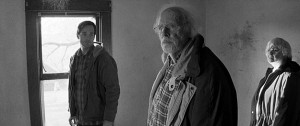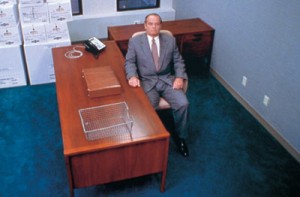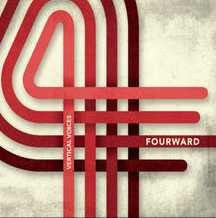 “What men value in this world is not rights but privileges.”
“What men value in this world is not rights but privileges.”
H.L. Mencken, Minority Report: H.L. Mencken’s Notebooks
Terry Teachout on the arts in New York City
 Mrs. T and I have been catching up in recent weeks with a string of once-new films that slipped past us when they came out. On Wednesday we finally got around to Nebraska, which we both found deeply moving.
Mrs. T and I have been catching up in recent weeks with a string of once-new films that slipped past us when they came out. On Wednesday we finally got around to Nebraska, which we both found deeply moving.
It surprises me in retrospect that we didn’t make more of an effort to see Nebraska two years ago. Alexander Payne, after all, is one of the very few contemporary film directors who speaks for me. I know his world—I grew up in it—and his feeling for the parts of America that figure in his films is precise and perfect. (Likewise Mark Orton’s score for Nebraska, which is as beautifully plain and direct as the film itself.)
 Part of what draws me to Payne’s work is that I have a special fondness for “satire” so close to literal representation as to be all but indistinguishable from it. That’s his specialty, and it’s what Nebraska is like. At times, in fact, it almost suggests a satirical version of The Trip to Bountiful. Yet just behind the comedy is an emotional affekt similar to that of Horton Foote’s masterpiece, whose simple but profound plot is undoubtedly echoed in Bob Nelson’s screenplay. Yes, Nebraska is funny—but all the laughter hurts.
Part of what draws me to Payne’s work is that I have a special fondness for “satire” so close to literal representation as to be all but indistinguishable from it. That’s his specialty, and it’s what Nebraska is like. At times, in fact, it almost suggests a satirical version of The Trip to Bountiful. Yet just behind the comedy is an emotional affekt similar to that of Horton Foote’s masterpiece, whose simple but profound plot is undoubtedly echoed in Bob Nelson’s screenplay. Yes, Nebraska is funny—but all the laughter hurts.
I reviewed Payne’s Election, About Schmidt, and Sideways in Crisis, and the second of those reviews also hints at the way I felt about Nebraska. Here it is, reprinted for the first time since it originally appeared in 2003.
* * *
In Hollywood, ordinary middle-class life is a state to be escaped, not examined. Unlike their novel-writing counterparts, American filmmakers are almost never willing to set a serious drama in a believable-looking small town (Kenneth Lonergan’s masterly You Can Count on Me was a rare exception) or even a medium-sized city anywhere other than on the East or West Coasts. To them, the vast expanse of terra incognita known in New York and Los Angeles as “flyover country” is little more than a breeding ground for cross-burners, serial murderers, and Republicans.
This iron law applies with particular force to the part of America where I was born and raised. It happens that I am writing this month’s column in a small midwestern town, the sort of place whose existence is all but unknown to most movie directors. As I unspooled a decade’s worth of memorable films in my head, I was hard-pressed to think of any that conveyed the slightest sense of what it looks and feels like to live in Red America. It’s revealing that the first ones to come to mind were Waiting for Guffman and Election, both of which are satires.
Now Alexander Payne, the director and cowriter (with Jim Taylor) of Election, has returned to Omaha, Nebraska, to make a very different sort of movie about life among the regular guys. To be sure, About Schmidt is also a satire, but its comic effects are much less broad than those of Election—indeed, you almost have to come from the Midwest to know that Payne and Taylor are exaggerating anything at all. Had Payne cast an actor other than Jack Nicholson, who is incapable of understatement, to play the part of Warren Schmidt, a superfluous middle manager whose tightly wrapped life unravels when he is nudged into the comfortable oblivion of retirement, it might well have been possible to take About Schmidt at something close to face value.
As it is, Nicholson does his best to keep from over-egging the pudding, but for all his palpably good intentions, I kept wishing that Payne had cast someone more like William H. Macy. But, then, you can’t make a big-budget movie without at least one big-budget star, and Nicholson is more than good enough to make About Schmidt much more than plausible. Even with Nicholson, it is one of the very best movies about which I have been lucky enough to write in this space.
 Like Barbershop, another fine film that seeks to show the world as it is, About Schmidt doesn’t have much of a plot. Warren Schmidt is settling uneasily into a boring retirement when he comes home one day and finds his wife, Helen (June Squibb), dead on the floor of their kitchen. The shock of her death throws him into a depression from which he seeks to extract himself by driving from Omaha to Denver in his motor home, there to visit his soon-to-be-married daughter, Jeannie (Hope Davis, one of the best of the many fine actresses to come out of the indie-flick movement). Randall, Jeannie’s fiancé (Dermot Mulroney), is a long-haired waterbed salesman whose family never quite got over the Sixties. Jeannie loves him, but Schmidt loathes him, and the prospect of seeing his only child vanish into a mediocre marriage forces him to take an unsparing look at his own unsatisfying life.
Like Barbershop, another fine film that seeks to show the world as it is, About Schmidt doesn’t have much of a plot. Warren Schmidt is settling uneasily into a boring retirement when he comes home one day and finds his wife, Helen (June Squibb), dead on the floor of their kitchen. The shock of her death throws him into a depression from which he seeks to extract himself by driving from Omaha to Denver in his motor home, there to visit his soon-to-be-married daughter, Jeannie (Hope Davis, one of the best of the many fine actresses to come out of the indie-flick movement). Randall, Jeannie’s fiancé (Dermot Mulroney), is a long-haired waterbed salesman whose family never quite got over the Sixties. Jeannie loves him, but Schmidt loathes him, and the prospect of seeing his only child vanish into a mediocre marriage forces him to take an unsparing look at his own unsatisfying life.
One of the smartest things about Election was Alexander Payne’s refusal to let any of his characters off easy, even the ones with whom he might well have been expected to sympathize. Yes, Schmidt’s life has been emotionally constricted, but that didn’t make it altogether meaningless; yes, Randall and his family are more open to experience, but this openness has not made them better than Schmidt, just different. Most filmmakers make it agonizingly clear which side they’re on, but in About Schmidt as in Election before it, Payne casts a cold eye on all he sees. (It tells us everything we need to know about Randall, for instance, that he and Jeannie walk down the aisle to the insipid strains of Dan Fogelberg’s “Longer.”)
Interestingly enough, the only aspect of midwestern life about which About Schmidt has nothing interesting to say is religion. Warren Schmidt is experiencing a full-blown spiritual crisis, one whose seriousness is in no way diminished by his own smallness of soul, and it is surprising—to put it mildly that at no time in the course of the movie does he look to religion, organized or otherwise, as a possible source of enlightenment or solace. One could easily imagine his having been left in the lurch by the spiritual blandness of latter-day mainline Protestantism, in much the same way that Kenneth Lonergan skewers the sin-free Methodism of the clergyman he plays in You Can Count on Me. Yet in a film otherwise notable for its uncanny fidelity to fact, it is impossible to forget that a couple like Warren and Helen Schmidt would almost certainly have been fairly regular churchgoers in real life.
Time: near the end of a leisurely dinner. Place: Restaurant 15 Main, Narrowsburg, New York. Frank Sinatra’s recording of “Thanks for the Memory” is playing in the background.
SHE I never liked that song.
HE Well–
SHE Don’t say it–I already know what you’re going to say. “Well, I like it.” Of course you like it. You’re got more in common with your parents’ generation than with ours.
HE What do you mean? I know twice as much about rock and roll as you do.
SHE Yeah, but you never hung out in bars and danced with girls when you were in high school. …
Read the whole thing here.
Satchmo at the Waldorf is in rehearsal at the Wallis Annenberg Center for the Performing Arts in Beverly Hills, where performances start next Tuesday—but I’m in New York, which is nowhere near Beverly Hills. What gives?
 The truth is that my presence isn’t required at the Wallis, which is presenting what’s called a “remount” of the 2014 off-Broadway production of my first play. Same set, same actor and director, same staging, and—yes—the same script. When Dramatists Play Service publishes the play later this year, the printed version will be the one that was performed off Broadway and is about to be done in California. I “froze” the text two weeks before we opened in New York, and I see no reason to thaw it out now. For better or worse, I’m done with Satchmo.
The truth is that my presence isn’t required at the Wallis, which is presenting what’s called a “remount” of the 2014 off-Broadway production of my first play. Same set, same actor and director, same staging, and—yes—the same script. When Dramatists Play Service publishes the play later this year, the printed version will be the one that was performed off Broadway and is about to be done in California. I “froze” the text two weeks before we opened in New York, and I see no reason to thaw it out now. For better or worse, I’m done with Satchmo.
That doesn’t mean I’m not going to fly out to the Wallis. I’ll be on hand for next Tuesday’s preview performance and the Wednesday-night opening. But unless someone cares to interview me about Satchmo at the Waldorf while I’m in town, there won’t be any reason for my presence. Not only are John Douglas Thompson and Gordon Edelstein perfectly capable of rehearsing Satchmo without me, but I have a day job that requires my regular attention. When I do come, I’ll be there to watch—and, I have no doubt, to learn. I learn something new about the mysterious art of playmaking every time I see a performance of Satchmo. But there comes a moment in the life of every playwright when he must walk away from his play, just as wise parents eventually set their children free and let them find their own way in the world.
As I wrote a month after Satchmo opened in New York:
I still find it fascinating to watch John perform Satchmo. If any other actors should appear in the play in the future, I’ll be just as eager to see them do it, and (if possible) to help them rehearse it. But the huge psychic space that Satchmo has occupied in my mind for the past couple of years is finally starting to shrink, like a thirsty tumor responding to chemotherapy.
That’s a healthy development, and I think that it’s probably also an inevitable one. Moss Hart spoke in Act One of the moment when a playwright realizes that his play “is no longer his, that it belongs to the actors and the audience now, that a part of himself is to be judged by strangers and that he can only watch it as a stranger himself.” I, too, know that feeling. When I watch Satchmo, it feels as if someone else wrote it, and should I ever direct it, I expect I’ll feel the same way.
Books are like that, too. On the increasingly rare occasions when I pick up Duke or Pops or The Skeptic, I can’t recall how it felt for the words on the page to be pouring out of my fingers, still malleable and full of potential. All that is over now. They’re on their own, and I wish them well.
* * *
Satchmo at the Waldorf runs May 26-June 7 at the Wallis Annenberg Center for the Performing Arts. To order tickets or for more information, go here.
 The best jazz vocal group I’ve ever heard just made its New York debut.
The best jazz vocal group I’ve ever heard just made its New York debut.
Vertical Voices began life five years ago as a collaboration between Julia Dollison, a singer of phenomenal talent, and Kerry Marsh, an arranger of exceptional skill and imagination. Inspired by the Singers Unlimited, the now-legendary studio-only vocal quartet that performed the unprecedentedly complex charts of Gene Puerling, Julia and Kerry recorded an album of big-band compositions by Maria Schneider in which they used overdubbing to sing all of Maria’s original horn parts, a staggering feat of technical wizardry.
I wrote the liner notes for Observatory, Julia’s 2005 debut album. Since then I’ve watched her blossom into an artistic maturity that even I couldn’t have foreseen when I first heard her sing a decade and a half ago. I attribute this transformation to her partnership with Kerry, whose challenging charts bring out the best in Julia and whose own fine singing has grown exponentially in finish and self-assurance since they started working together.
The only thing missing from Vertical Voices: The Music of Maria Schneider was the high-wire excitement that comes from the galvanizing stimulus of live performance. So when I learned that Julia and Kerry had joined forces with Jennifer Barnes and Greg Jasperse, two talented singers of similar background and style, to perform both on record and in public, I had no doubt that something very, very good would come of it—and it has.
 First came Fourward, a newly released CD on which Julia, Kerry, Jennifer, and Greg sing a wide-ranging, engagingly varied program of songs and compositions by everyone from Johnny Mandel to Pat Metheny, whose music, like that of Maria Schneider, has been an “integral part” (as they put it) of the inspiration for Vertical Voices. Then the quartet started appearing at vocal jazz festivals, and on Saturday Vertical Voices came to New York to sing a one-nighter at Subculture, a newish Greenwich Village nightclub that shares space with the Culture Project’s Lynn Redgrave Theater, which I occasionally visit in the course of my duties as a drama critic.
First came Fourward, a newly released CD on which Julia, Kerry, Jennifer, and Greg sing a wide-ranging, engagingly varied program of songs and compositions by everyone from Johnny Mandel to Pat Metheny, whose music, like that of Maria Schneider, has been an “integral part” (as they put it) of the inspiration for Vertical Voices. Then the quartet started appearing at vocal jazz festivals, and on Saturday Vertical Voices came to New York to sing a one-nighter at Subculture, a newish Greenwich Village nightclub that shares space with the Culture Project’s Lynn Redgrave Theater, which I occasionally visit in the course of my duties as a drama critic.
Needless to say, vocal groups have come a long way since the Swing Era, but I’ve never heard anything like Vertical Voices. Yes, the Singers Unlimited specialized in arrangements of then-unprecedented harmonic richness, but they never dared to sing them in front of an audience, nor did they venture beyond the well-worn standards and pop tunes that were their stock-in-trade. Not so Vertical Voices, whose repertoire is unambiguously contemporary—Kerry sees to that—and which is capable of tossing off edge-of-the-seat live versions of charts that are demanding almost beyond belief. The performance of “The ‘Pretty’ Road” heard on Vertical Voices: The Music of Maria Schneider was laid down one track at a time in a recording studio and carefully polished to a high gloss. The version that I heard on Saturday night, by contrast, was done without benefit of headphones, overdubbing, pitch correction, or multiple takes: Vertical Voices simply stood up in front of a rhythm section and sang it, and did so with the go-for-it punch of a nineteen-piece big band. That’s virtuosity.
Mere perfection, of course, is only the starting point of a great performance. It takes something else, something personal and ultimately mysterious—though the “secret” of Vertical Voices is in fact no secret at all. It’s highly unusual for a close-harmony vocal group to feature a lead singer as individual-sounding as Julia. As I wrote in my liner notes for Observatory, her voice is
warm, airy, dappled with summer sunshine, technically bulletproof from top to bottom….Yet she never coasts on her chops. Instead, she sings like a horn player in love with lyrics, the way Lester Young knew all the words to every ballad he played. Her solos are pointed and meaningful, little musical stories that take you to places you’ve never been.
 While Julia is perfectly capable of stepping back and blending with her colleagues whenever the music calls for it, her unique sound adds a personal color to all of the group’s ensemble work, and each time she solos, the whole room sits up as one and takes notice. Yet Vertical Voices really is a group, not a solo act in disguise: Jennifer and Greg are first-class singers (and arrangers) in their own right, and Kerry’s gorgeous charts, with their wide-spaced harmonies and tingling dissonances, are as good as postmodern vocal-group writing gets. The result was an exhilarating evening of jazz that will echo in my memory for a long, long time to come.
While Julia is perfectly capable of stepping back and blending with her colleagues whenever the music calls for it, her unique sound adds a personal color to all of the group’s ensemble work, and each time she solos, the whole room sits up as one and takes notice. Yet Vertical Voices really is a group, not a solo act in disguise: Jennifer and Greg are first-class singers (and arrangers) in their own right, and Kerry’s gorgeous charts, with their wide-spaced harmonies and tingling dissonances, are as good as postmodern vocal-group writing gets. The result was an exhilarating evening of jazz that will echo in my memory for a long, long time to come.
When the cheering stopped, I made the slow return trip to my apartment in upper Manhattan, thinking about what I’d heard all the way home. Middle age is full of discontents, but one of its consolations is that you get to see what happens to gifted young artists as they press their promise against the hard grindstone of experience. Most falter and fail, while others hold steady, but the best ones keep on growing until, somewhere along the way, they suddenly become themselves. That’s what’s happened to Julia Dollison and Kerry Marsh: at long last, they are everything I hoped they’d be.
* * *
To order or download Fourward, go here.
Pat Metheny’s “Travels,” performed by Vertical Voices. The lyrics are by Julia Dollison and the arrangement is by Kerry Marsh:
| M | T | W | T | F | S | S |
|---|---|---|---|---|---|---|
| 1 | 2 | 3 | 4 | |||
| 5 | 6 | 7 | 8 | 9 | 10 | 11 |
| 12 | 13 | 14 | 15 | 16 | 17 | 18 |
| 19 | 20 | 21 | 22 | 23 | 24 | 25 |
| 26 | 27 | 28 | 29 | 30 | 31 | |
An ArtsJournal Blog